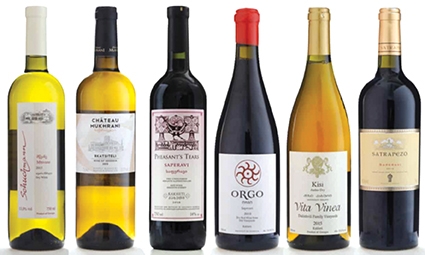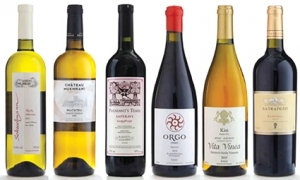86,2 Mil Bottles of Georgian Wine Exported in 2018
Georgian wine exports totaled 86.2 million bottles in 2018, 17% more compared to 2017. The figure is the highest in almost 30 years, showing a promising future for Georgian wines in 2019.
Georgian wine was exported to 53 countries around the world in 2018. Figures from the Georgian National Wine Agency reveal that Russia remains the top destination for wines, with a total of 53,682,627 bottles. Ukraine (10,687,835 bottles) takes second place, followed by China (6,951,019 bottles), Kazakhstan (3,599,143 bottles), and Poland (3,508,122 bottles).
Export to some countries increased massively. Switzerland imported 378% more Georgian wine compared to in 2017, with 25,350 bottles, whilst South Korea increased by 275% (68,128 bottles). Wine exports amounted to $184.1 million in 2018, 19% more than in 2017.
Georgian spirit exports also experienced positive growth in 2018. 20 million bottles of Brandy (0.5 liters) were exported to 26 countries, 9% more than in 2017. Brandy exports revenue amounted to $40.7 million. In addition, Chacha exports reached 422 thousand bottles to 26 countries, a growth of 47% and generating $1.2 million.
Winemaking is one of the most ancient traditions in Georgia. Indeed, Georgia is considered to be the birthplace of winemaking in the world. Despite its strong heritage and high-quality wines, Georgian wines have often been overlooked compared to other countries such as France, Italy and Spain.
Georgian wine has experienced setbacks during the country’s turbulent past. During the Soviet Union, Georgian vineyards suffered from Communist-driven cultivation restrictions, resulting in a dramatic decrease in the number of grape varieties to less than 20. Projects are underway to recover types of grapes that were lost during this time.
Nonetheless, wine is one of the biggest exports in Georgia. The Georgian wine industry has grown substantially over the past decade. The export market has increased by 73% since 2012 when Georgian wine was exported to 43 countries and sold 23 million bottles.
The record number of tourists visiting Georgia helps fuel the growth of the wine export market. “This year, the prestige of Georgian products has increased. Tourist inflow has also grown. The number of promoters of our wines has increased worldwide. This tells people who have visited Georgia and tasted wines here to try to do the same in their own countries, too,” stated Zurab Ramazashvili, head of the supervisory board of the Telavi Wine Cellar winemaking company. Telavi Wine Cellar sold 5.7 million bottles in 2018, a record number in the company’s history.
Moreover, government initiatives have helped wineries to expand. Wineries benefited from not paying profit tax in 2018, enabling them to reinvest more money back into their businesses. The government has also funded participation in agricultural exhibitions and tasting events abroad. “The government has specially hired companies for the popularization of Georgian wines abroad. All these efforts boost our sales,” said Ramazashvili. Georgian wine exhibitions were held around the world in 2018, for example in South Korea, France, the US and Japan.
In addition, international media exposure, such as the recent article published in the Washington Post titled ‘White Wine on the Red Planet? Scientists in Georgia are hunting for the perfect Martian grape’ are raising the profile of Georgian wine internationally. “If we’re going to live on Mars one day, Georgia needs to contribute. Our ancestors brought wine to Earth, so we can do the same to Mars,” Nikoloz Doborjginidze, founder of Georgia’s Space Research Agency and advisor to the Ministry of Education and Science told the Washington Post.
Although export to space may be a distant dream, Georgian wineries continue to expand into other markets around the globe. Head of the National Wine Agency Levan Mukhuzla stated that Georgian wine will be sold in Scandinavia and Canada from 2019.
By Amy Jones
Image source: The Observer











